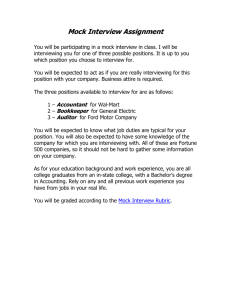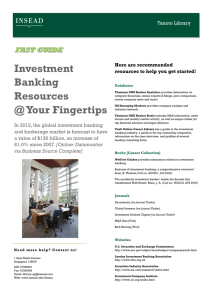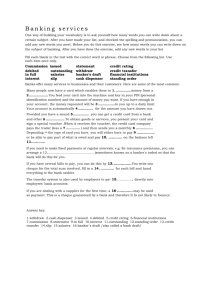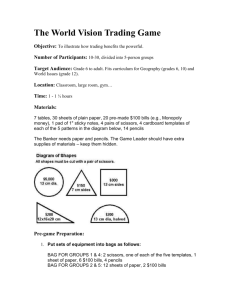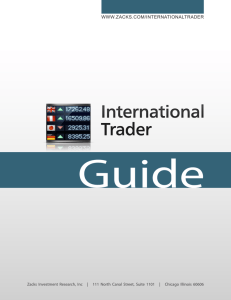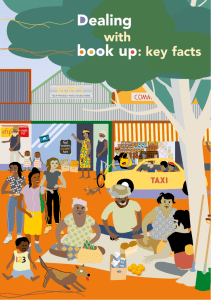Investment Banking Interview Questions & Tips
advertisement
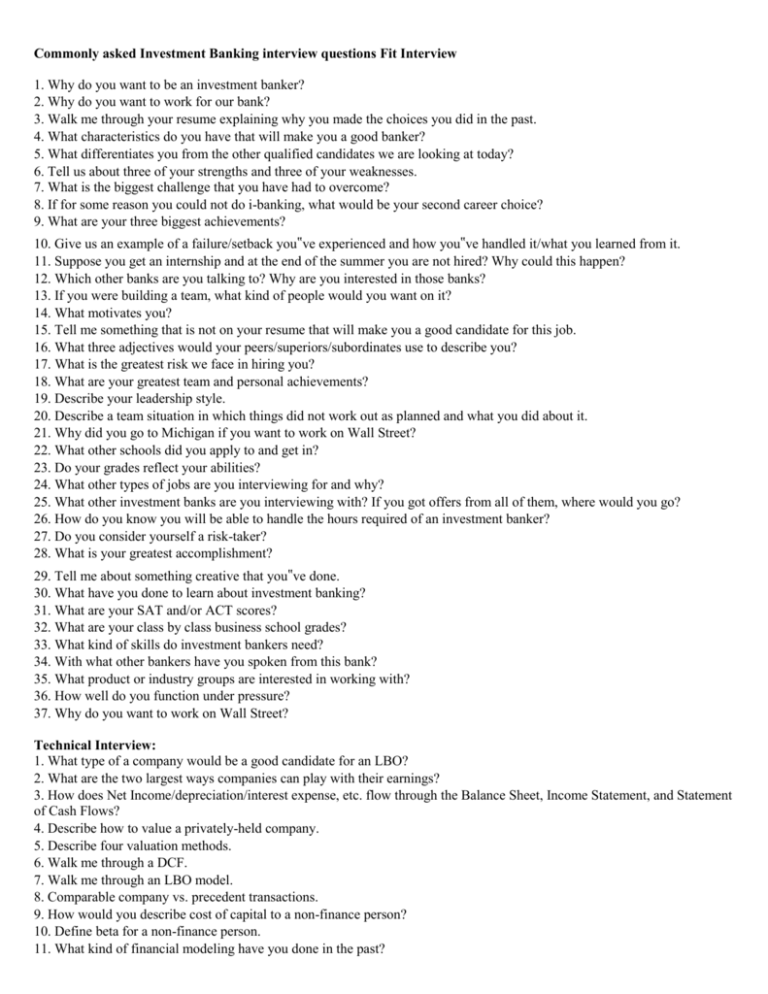
Commonly asked Investment Banking interview questions Fit Interview 1. Why do you want to be an investment banker? 2. Why do you want to work for our bank? 3. Walk me through your resume explaining why you made the choices you did in the past. 4. What characteristics do you have that will make you a good banker? 5. What differentiates you from the other qualified candidates we are looking at today? 6. Tell us about three of your strengths and three of your weaknesses. 7. What is the biggest challenge that you have had to overcome? 8. If for some reason you could not do i-banking, what would be your second career choice? 9. What are your three biggest achievements? 10. Give us an example of a failure/setback you‟ve experienced and how you‟ve handled it/what you learned from it. 11. Suppose you get an internship and at the end of the summer you are not hired? Why could this happen? 12. Which other banks are you talking to? Why are you interested in those banks? 13. If you were building a team, what kind of people would you want on it? 14. What motivates you? 15. Tell me something that is not on your resume that will make you a good candidate for this job. 16. What three adjectives would your peers/superiors/subordinates use to describe you? 17. What is the greatest risk we face in hiring you? 18. What are your greatest team and personal achievements? 19. Describe your leadership style. 20. Describe a team situation in which things did not work out as planned and what you did about it. 21. Why did you go to Michigan if you want to work on Wall Street? 22. What other schools did you apply to and get in? 23. Do your grades reflect your abilities? 24. What other types of jobs are you interviewing for and why? 25. What other investment banks are you interviewing with? If you got offers from all of them, where would you go? 26. How do you know you will be able to handle the hours required of an investment banker? 27. Do you consider yourself a risk-taker? 28. What is your greatest accomplishment? 29. Tell me about something creative that you‟ve done. 30. What have you done to learn about investment banking? 31. What are your SAT and/or ACT scores? 32. What are your class by class business school grades? 33. What kind of skills do investment bankers need? 34. With what other bankers have you spoken from this bank? 35. What product or industry groups are interested in working with? 36. How well do you function under pressure? 37. Why do you want to work on Wall Street? Technical Interview: 1. What type of a company would be a good candidate for an LBO? 2. What are the two largest ways companies can play with their earnings? 3. How does Net Income/depreciation/interest expense, etc. flow through the Balance Sheet, Income Statement, and Statement of Cash Flows? 4. Describe how to value a privately-held company. 5. Describe four valuation methods. 6. Walk me through a DCF. 7. Walk me through an LBO model. 8. Comparable company vs. precedent transactions. 9. How would you describe cost of capital to a non-finance person? 10. Define beta for a non-finance person. 11. What kind of financial modeling have you done in the past? 12. How would you calculate WACC/discount rate? 13. General market questions, Global market questions 14. Firm-Specific questions (recent deals, large deals, etc) Tips: Be prepared to meet with several people, all of whom would rather be doing something other than interviewing another MBA or BBA. Know that the interviewer may be friendly, but usually at one point they will put some pressure on you by asking a difficult or unrelated question just to see how you react under pressure. Know the distinctions between the major firms. Always dress professionally, don’t wear suspenders, pocket squares or double-breasted suits. Straight collar or spread collars are preferable to button down shirts. Commonly asked Sales & Trading interview questions: Skills Related: 1. Tell me about a time when you had to make a difficult decision (professional). 2. When have you used quantitative information at work? 3. What other things are you looking at if not sales and trading? 4. What qualities do you think you have that would make you a good sales person? 5. What makes you unique? 6. What are two weaknesses you possess? 7. What are your strengths? 8. What previous experience have you had that is related to Sales and Trading? 9. What skills do you have that would make you a good trader (Trader salesperson)? 10. Do you consider yourself good at careful analysis or on-your-feet problem solving? 11. What is the biggest risk you have ever taken? 12. What is the most important attribute of a good salesperson? 13. What about S&T most interests you why? 14. Tell me about a time you had to motivate a group. 15. How would you describe your leadership style? 16. Tell me about someone whom you admire? 17. Why did you choose Michigan? 18. What is the best and worst thing someone could say about you? Sales and Trading Functional: 1. Why debt vs. equity? 2. What particular markets or instruments are you interested in? Tell me some major trends briefly. 3. Do you want to trade or sell? 4. What makes you think you can sell? Sell this can of soda (at the interview room) to me. 5. Sell me your favorite stock. 6. What is going to make you make the calls you hate to make? 7. What is your favorite stock and why? What’s the P/E on that stock? 8. Who is your favorite trader? 9. What have you learned from your personal investment experience? 10. If you couldn’t be a trader (salesperson), what would you be? Market Questions: 1. What stocks do you follow? What would make you buy that stock? 2. Why is the P/E a good indicator? 3. Give me your opinion on the economy. 4. I want to take advantage of low interest rates because I plan to buy a house in two years. What do I do? 5. Tell me about the risk of corporate bonds. 6. What is the price of: yen, pound, euro, gold, crude oil, Fed Fund rate, the 30 yr t-bill rate, etc. 7. How do you stay on top of the markets? 8. What would you buy and what would you short? 9. How would you invest $1 million today? 10. What is unique about the US treasury market vs. the rest of the debt market? 11. What is Junk (bond)? 12. Tell me what an institutional investor is. 13. How does compounding work? 14. How does the yield curve work? What does it mean when it is upward sloping? 15. Why do we care about housing starts? 16. What do you think will happen with interest rates over the next six months? 17. What is a hedge fund? What is the nature of the relationship between brokerage houses and hedge funds? Bibliography of Information resources So You Want to be an Investment Banker, by Wet Feet Press, Kresge Library. A Comprehensive Guide to the Investment Banking Job Search, by Joe Hyde, BBA „96 Investment Dealers Digest, an important Wall Street trade magazine available in Kresge Barron‟s, good reference for equities. The Economist, especially important for FX and international bonds and equities. Careers in Investment Banking career packet, Kresge Library


